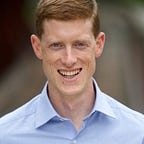Buttigieg, Bernie, and the Billionaires
A strange thing happened the other night in Manchester, New Hampshire. At a NH Democratic Party dinner featuring all ten Democratic candidates ahead of Tuesday’s First-in-the-Nation presidential primary, a boisterous crowd of Bernie Sanders supporters tried to shout down Pete Buttigieg with chants of “Wall Street Pete!”
It was a striking, if momentary, interruption to an otherwise genial affair, in which one Democratic official after another appealed for party unity to defeat Donald Trump. Even the crowd of yellow-clad Buttigieg supporters standing opposite the “Bernie bros” greeted their candidate’s chief rival, Sen. Sanders, with polite applause.
But perhaps I shouldn’t have been surprised by the disruption. In recent weeks, a rising drumbeat of social media attacks has sought to paint Buttigieg as beholden to the Billionaire Class, Big Banks, Big Oil, or all of the above. Their effect has been to instill doubt in the minds of undecided voters as to whether Buttigieg can be trusted to fight the big fights — from climate to healthcare to inequality — that Democrats rightfully demand.
Although Buttigieg has naturally preferred not to give voice to such attacks when asked in interviews, for the many Primary voters torn between head and heart––between the desire to defeat Trump on one hand and the yearning to vote their conscience on the other —the question of Buttigieg’s identity on democracy issues begs a response.
Here is mine.
Nerdy as it sounds, my earliest conversations with Pete Buttigieg some fourteen years ago in graduate school centered on fixing American democracy. Together with a small group of friends Buttigieg convened during our student and young professional years, a self-styled “Democratic Renaissance Project,” we sought to understand the structural impediments to a healthy democracy and the means of advancing durable, systemic reform.
When I took up the cause full-time after graduate school as president of Americans for Campaign Reform (now Issue One), Buttigieg and our circle of friends assisted in developing a new approach to publicly funded elections that empowered small donors instead of the wealthy few. Our public funding match was first introduced in Congress by Sen. Dick Durbin (D-Illinois) in 2009 and finally won passage in the Democratic-controlled House last year as part of an ambitious democracy agenda known as HR 1. It continues to languish in the Senate under Sen. Mitch McConnell (R-Kentucky), pending a new Senate majority and President.
Beyond his early participation in developing democracy reforms, Buttigieg has sought to put a better system of “citizen-funded elections” into practice. When he launched his first campaign for Indiana State Treasurer in 2010, we worked together on ways that he could “walk the talk” of reform while also remaining viable as a candidate in a state awash with private campaign cash. Running against a corporate-backed incumbent, Pete refused to accept contributions from banks or their political action committees, calling such support a “conflict of interest” since the state treasure enters into contracts with banks on behalf of citizens. He also set a voluntary cap on the size of individual contributions his campaign could receive from individual bankers.
That first foray into electoral politics, although unsuccessful, set the template for Buttigieg’s future campaigns, culminating in his current presidential bid. Applying the same principle that large donations from special interests distort our democracy, the Pete for America campaign voluntarily rejects all contributions from lobbyists, corporate PACs, and fossil fuel executives. To meet the fundraising imperative of an upstart presidential campaign in the absence of public funding, Buttigieg has sought to engage as many small donors as possible while also holding taped fundraisers where wealthier individuals can contribute up to the legal limit of $2,800. So far, he has brought in over two million donations averaging around $35 apiece from more than 800,000 individual citizens, and counting. Nearly all have come in online.
At the same time as Buttigieg works within a far-from-perfect system to raise the resources he needs to compete, his commitment to structural reform is clear.
Since the improbable launch of his presidential exploratory committee a year ago, Buttigieg has made democracy a central pillar of the campaign. In policy briefs, debates, and on the stump, he has advocated for publicly funded elections and a slew of other institutional reforms that are essential to realizing the promise of American democracy. They include overturning Citizens United and the money-is-speech jurisprudence on which it is based; establishing universal automatic voter registration and an Election Day holiday; extending full voting rights to citizens in Puerto Rico and the District of Columbia through statehood; replacing partisan gerrymandering with independent redistricting commissions; and ending voter suppression once and for all.
More than just including democracy issues on a long list of policy priorities, Buttigieg has committed to putting public funding and the accompanying political reforms first if he is elected president. The logic is simple yet profound, as he stated in the NBC Presidential Debate: “We’ve got to fix our democracy before it’s too late. Get that right [and] climate, immigration, taxes, and every other issue gets better.”
I don’t fault the “Bernie bros” for their passion and I stand ready to join their crusade if Sen. Sanders is the nominee against President Donald Trump. But the next time they feel the urge to shout down “Wall Street Pete” or deride him to fellow Democrats as a shill to billionaires, I hope they’ll take a deeper look at his past, his plans, and his priority for democratic reform. They might just find a teammate.
Lord knows we’ll need plenty of those, as well as a committed captain, to win the day for democracy in November.
